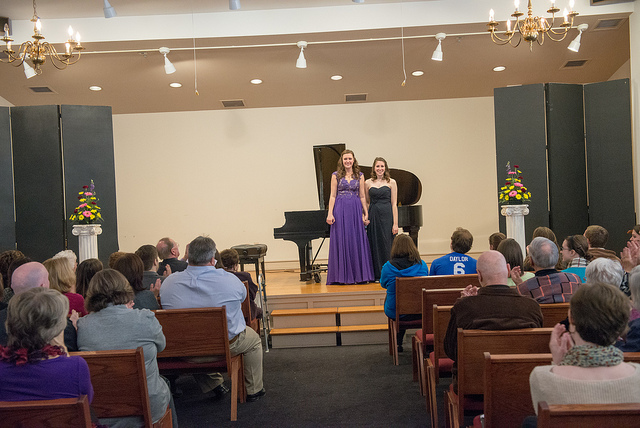
Music majors fill Zug Memorial Hall with music each spring semester by performing senior recitals. Friends and family members will gather in the music hall from now until Commencement to watch 10 seniors perform on their principal instrument, including voice. “For music majors I feel like it’s graduation; like our big moment,” said music therapy major Marissa Jones.
This semester’s recitals begin at 3 p.m. Sunday, Feb. 8, and continue throughout the semester. Seniors Marissa Jones and Robert Codio, who plays the horn, kick off the concerts. Jones plays the cello, an instrument she has been performing on since third grade. Jones also plays the piano and guitar and sings in the college’s all-female a capella group, Melica. “I actually thought I couldn’t sing when I came to E-town, but being in Melica helps me be creative with music in a different way.”
A music major’s senior recital is the capstone experience. Each recital requires a student to perform a half hour of music on the instrument they have been studying during their eight semesters at E-town. “This recital is a combination of the four years of study on their instrument and the knowledge gained from their music classes, “ said Dr. James Haines, chair of the Department of Fine and Performing Arts. “Students will be able to understand the structure of the music as well as how to perform the piece based on who wrote it, the time period and the emotional quality.”
For music majors I feel like it’s graduation; like our big moment.”
Before being granted a recital, students must pass a jury three weeks before their performance. “This jury consists of three faculty members from the department, one being the student’s private teacher and two others of their choice,” said Haines. During the jury performance, students are asked to perform any of the pieces on the list they have created for their recital. If it is found that the student is at an appropriate level and will have a successful performance, the jury will pass him or her. “There is no grade on the recital,” said Haines. “We want the pressure to be off.”
Music majors have been practicing around the clock for their performances, some for years. “Usually around recitals, I’ll play two hours a day, but depending on my schedule sometimes that can’t happen” said Jones. “That’s when I have to pack the weekends and play only an hour a day during the week.”
The cello player picked her music for the recital in September, while many students have been working on their pieces for years. “I first was just learning the music but now I’m at the point where I’m working on more of the performance aspect which is pretty cool that I’m now on a level where I can do that.”

